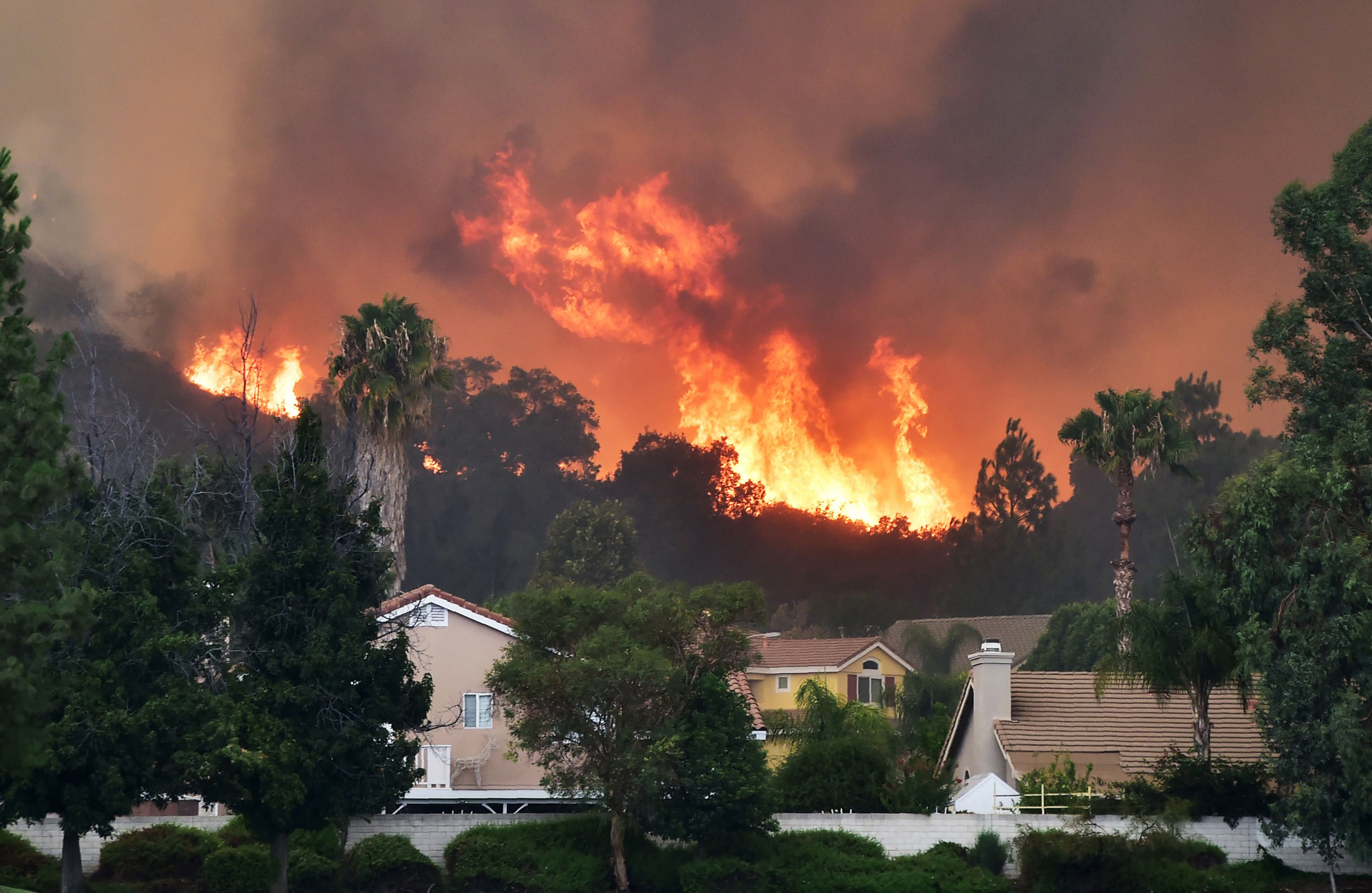Man accused of setting massive 2018 Holy Fire acquitted of arson
Man acquitted in 23,000-acre 2018 ‘Holy Fire’
A Trabuco Canyon man who was accused of setting fire at his neighbor’s remote cabin, sparking the massive 2018 Holy Fire, was acquitted Thursday of arson charges.
SANTA ANA, Calif. – A Trabuco Canyon man who was accused of setting a blaze at his neighbor’s remote cabin, sparking the massive 2018 Holy Fire, was acquitted Thursday of arson charges but convicted of making criminal threats.
An attorney for Forrest Gordon Clark, 56, argued during the trial that law enforcement experts made a “rush to judgment” in accusing him of setting the fire that burned 23,000 acres and destroyed 18 structures.
Jason Phlaum of the Alternate Defender’s Office told jurors that defense experts were more thorough in their investigation of the Holy Fire’s origins, concluding it began along a roadway, not in a cabin neighboring Clark’s. Phlaum said the fire was more likely sparked by exhaust from a passing truck or a discarded cigarette, noting that witnesses reported seeing a white truck pass through the remote area around the time the fire began.
Prosecutors accused Clark of setting fire to the cabin of his next-door neighbor, Frank Romero on Aug. 6, 2018. Clark lived in Cabin 14 and Romero lived in Cabin 15, which were the closest residences in Trabuco Canyon, just 30 to 40 feet apart, Deputy District Attorney Dominic Bello said.
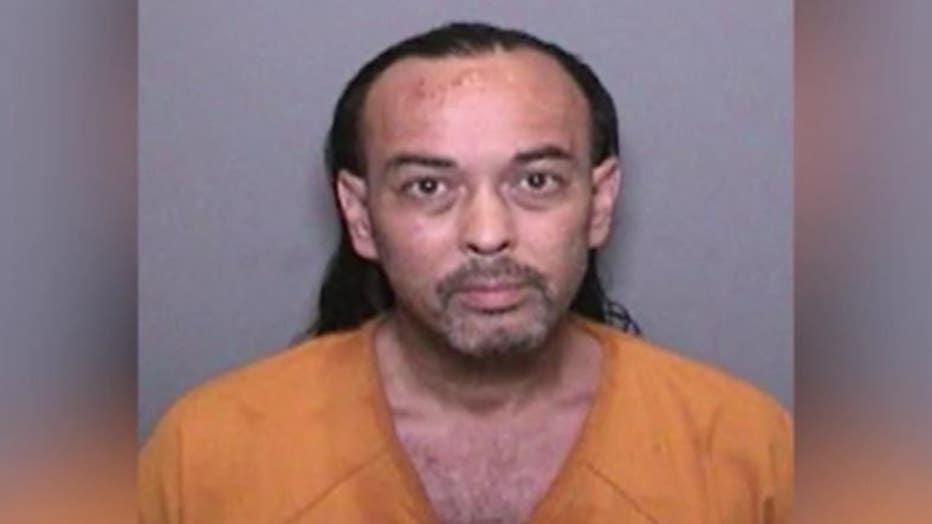
Forrest Gordon Clark
“He had the means and motive to start this fire,” Bello said in his closing argument of the trial that started in April.
Bello argued that Clark had a burn mark on his shoulder when he was arrested, and while the defendant claimed to investigators he suffered it while fighting the blaze, there were no witnesses to back up that contention.
A key piece of evidence in the prosecution’s case was a recording from Romero’s phone, in which Clark is heard threatening to harm his neighbor about five hours before the blaze started. Sprinkled in with lewd insults on the recording were declarations such as, “Frank is a walking dead man,” Bello said.
Jurors convicted Clark of felony criminal threats, but acquitted him of aggravated arson of five or more inhabited structures, arson of an inhabited structure and arson of a structure or forest. Clark faced a life sentence if he had been convicted of arson.
Orange County Superior Court Judge Patrick Donahue rejected Bello’s request to continue sentencing so Romero could make a victim impact statement. Donahue said he offered Romero the chance to call him on the phone or talk to him through video conferencing about the impact of the crime before sentencing, but the judge said he could not postpone the sentencing because Clark had far more credits for custody than any possible punishment available to the defendant.
Clark had credit for 3,520 days in custody awaiting trial and the maximum punishment in the case was two years, Donahue said. Donahue sentenced Clark to two years and ruled that Clark had enough leftover custody credits to cover any parole as well.
Bello said Romero was several hours away and could not drive in to the sentencing in time on Thursday. He also relayed that he didn’t “feel comfortable” making the victim impact statement on Thursday, Bello said.
“I don’t think I’m in a position to keep Mr. Clark in custody” any longer for no reason, Donahue said. “If Mr. Romero wants to write me a letter, that’s fine.”
Donahue said he would not reduce the felony to a misdemeanor, however.
“It was a lengthy four-minute threat and a threat to the life of Mr. Romero,” Donahue said, adding that he recalled how “shook up” Romero appeared to be by the threats when he testified in the trial about them.
Bello asked Donahue to at least order Clark to report to parole, but the judge said he could not do that either.
“If I ask him to go to parole, they would just tell him to go home,” Donahue said. “And if he didn’t go to parole, I couldn’t do anything anyway. It’s moot. I can’t put a warrant out for him for nothing.”
Clark said he wanted to “put this on the record that I don’t accept this sentence,” prompting Donahue to remind him why he had just instructed him on his appeal rights. Clark said he intended to appeal the conviction. source
DA’s Office should not handle case against man accused of massive Holy fire, lawyer says
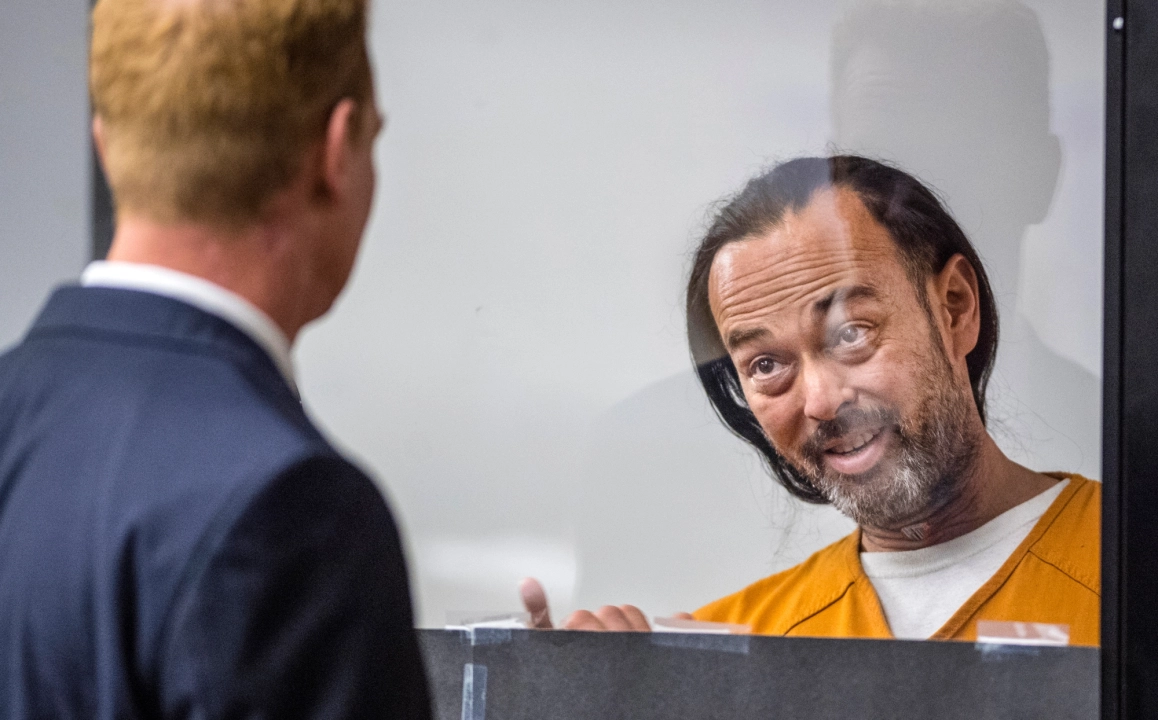
Forrest Clark, the man accused of intentionally setting the massive Holy fire in the Cleveland National Forest, speaks with one of his attorneys in Orange County Superior Court on Aug. 17, 2018. (Photo by Mark Rightmire, Orange County Register/SCNG)
“Mr. Spitzer tried to portray himself as sounding tougher than tough, tougher than Mr. Rackauckas, and committing himself to positions in open cases,” Phlaum told Orange County Superior Court Judge Patrick Donahue during a hearing on Monday, March 20.
The defense attorney also alleged that Spitzer’s public comments may have dissuaded investigators from pursuing a different Canyon resident as a suspect.
The state Department of Justice has argued that there is no reason why the DA’s Office should not prosecute the case. If the DA’s Office was kicked off of the case, it would almost certainly go the California DOJ.
During Monday’s hearing, Deputy District Attorney Keith Burke argued that Spitzer was speaking to his constituents as a county supervisor when he referenced Clark in 2018. He added that DA candidates are allowed to talk about their thoughts on the law and on how they would handle particular cases.
“You are communicating to the electorate, ‘I think this is what should happen generally and this is what should happen specifically,’” Burke said.
The prosecutor also noted that the most significant move by prosecutors in the Clark case since Spitzer took office was to successfully seek the dismissal of some charges Clark was facing due to a lack of evidence. A different judge in 2018 found there was enough evidence for Clark, now 56, to face trial for the remaining arson and criminal-threats charges.
Judge Donahue told the attorneys that he will announce his decision regarding the motion to recuse the DA’s Office on Wednesday.
Prosecutors, during a 2018 preliminary hearing, relied heavily on threats Clark was accused of making against his fellow canyon residents as well as Clark responding to being asked if he started the fire by saying, “No, but maybe.” source
Man acquitted of igniting massive Holy fire in Orange and Riverside counties
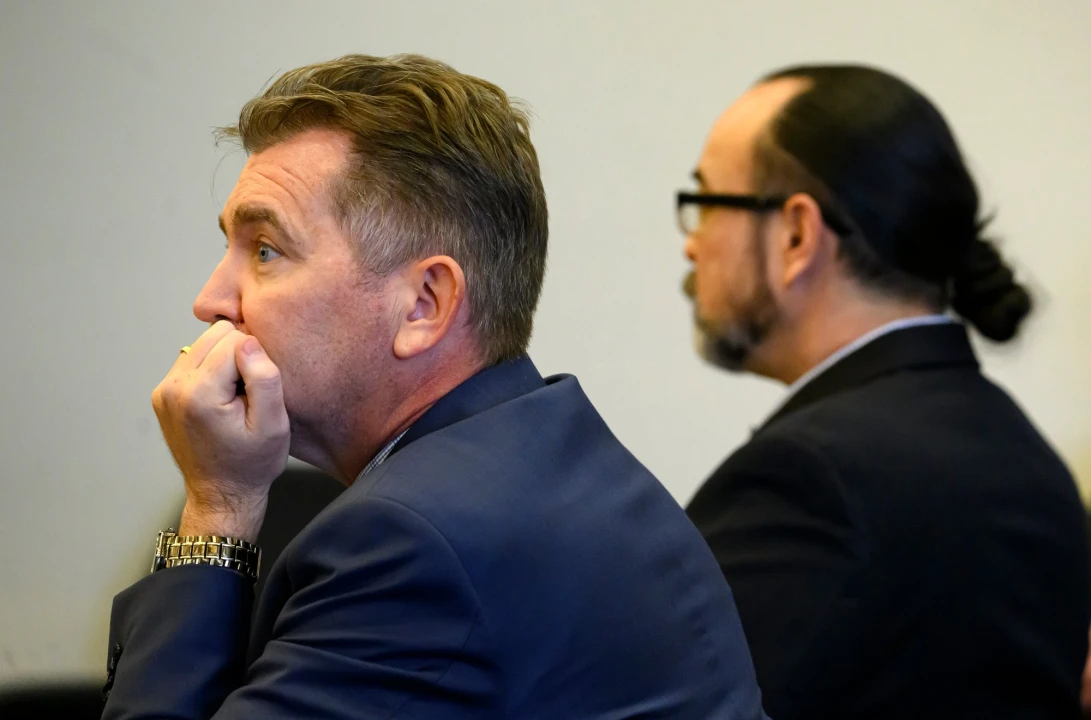
Nearly five years after fast-moving flames tore through more than 20,000 wildland acres in Orange and Riverside counties, an Orange County Superior Court jury acquitted the man accused of igniting the 2018 blaze.
Jurors, following a month-long trial in a Santa Ana courtroom, deliberated for a little more than a day before finding Forrest Clark, 56, not guilty of three felony counts of arson.
The jury did convict him of one remaining felony count of making criminal threats against his neighbor. But with the maximum possible sentence for that crime being two years behind bars and two years of parole, and Clark having spent nearly five years in local lockup awaiting the arson trial, Judge Patrick H. Donahue on Thursday afternoon, June 1, noted that Clark has already served his time and will be released from custody.
Had he been convicted of the arson charges, Clark would have faced a potential life sentence.
Even before the fire was fully extinguished, investigators accused Clark of igniting the Holy fire, with prosecutors later arguing the alleged arson stemmed from a long-running neighbor dispute. During one press conference, District Attorney Todd Spitzer referred to Clark as a “monster.”
But, during his Santa Ana trial, Clark’s attorney, Alternate Defender Jason Phlaum, sharply criticized what he characterized as a sloppy and inadequate investigation by U.S. Forest Service and Orange County Fire Authority officials, repeatedly arguing that they failed to prove the wildfire was intentionally set or that Clark was at fault.
“If this investigation was done right, they would have come to the conclusion that Mr. Clark is innocent,” the defense attorney said. “He didn’t set this fire, he is not responsible for this fire, he did not commit an act of arson causing the Holy fire.”
With no physical evidence directly tying Clark to the fire’s ignition, threats Clark apparently aimed at his closest canyon neighbor along with seemingly self-incriminating comments a raving Clark made to fire investigators were the focus of the prosecution’s case.
Need a great attorney who will fight for you?
Jason Michael Guerrero-Phlaum #268989
License Status: Active
Address: 600 W Santa Ana Blvd Ste 600, Santa Ana, CA 92701-4552
Phone: 657-251-6730
Orange County man accused of setting Holy fire acquitted of arson, convicted of threats

A Trabuco Canyon man who was accused of setting a blaze at his neighbor’s remote cabin, sparking the massive 2018 Holy fire, was acquitted Thursday of arson charges but convicted of making criminal threats and was sentenced to time already served in jail awaiting trial.
An attorney for Forrest Gordon Clark, 56, argued during the trial that law enforcement experts made a “rush to judgment” in accusing him of setting the fire that burned 23,000 acres in Orange and Riverside counties and destroyed 18 structures.
Jason Phlaum of the Alternate Defender’s Office told jurors that defense experts were more thorough in their investigation of the Holy fire’s origins, concluding it began along a roadway, not in a cabin neighboring Clark’s. Phlaum said the fire was more likely sparked by exhaust from a passing truck or a discarded cigarette, noting that witnesses reported seeing a white truck pass through the remote area around the time the fire began.
Prosecutors accused Clark of setting fire to the cabin of his next-door neighbor, Frank Romero, on Aug. 6, 2018. Clark lived in Cabin 14 and Romero lived in Cabin 15, which were the closest residences in Trabuco Canyon, just 30 to 40 feet apart, Deputy Dist. Atty. Dominic Bello said.
“He had the means and motive to start this fire,” Bello said in his closing argument of the trial that started in April.
Bello argued that Clark had a burn mark on his shoulder when he was arrested, and while the defendant claimed to investigators he suffered it while fighting the blaze, there were no witnesses to back up that contention.
A key piece of evidence in the prosecution’s case was a recording from Romero’s phone, in which Clark is heard threatening to harm his neighbor
about five hours before the blaze started. Sprinkled in with lewd insults on the recording were declarations such as, “Frank is a walking dead man,” Bello said.
Jurors convicted Clark of felony criminal threats but acquitted him of aggravated arson of five or more inhabited structures, arson of an inhabited
structure and arson of a structure or forest. Clark faced a life sentence if he had been convicted of arson.
Orange County Superior Court Judge Patrick Donahue rejected Bello’s request to continue sentencing so Romero could make a victim impact statement.
Donahue said he offered Romero the chance to call him on the phone or talk to him through video conferencing about the impact of the crime before sentencing, but the judge said he could not postpone the sentencing because Clark had far more credits for custody than any possible punishment available to the defendant.
Clark had credit for 3,520 days in custody awaiting trial and the maximum punishment in the case was two years, Donahue said. Donahue sentenced Clark to two years and ruled that Clark had enough leftover custody credits to cover any parole as well.
Bello said Romero was several hours away and could not drive in to the sentencing in time on Thursday. He also relayed that he didn’t “feel
comfortable” making the victim impact statement on Thursday, Bello said.
“I don’t think I’m in a position to keep Mr. Clark in custody any longer for no reason,” Donahue said. “If Mr. Romero wants to write me a letter, that’s fine.”
Donahue said he would not reduce the felony to a misdemeanor, however. “It was a lengthy four-minute threat and a threat to the life of Mr.
Romero,” Donahue said, adding that he recalled how “shook up” Romero appeared to be by the threats when he testified in the trial about them.
Bello asked Donahue to at least order Clark to report to parole, but the judge said he could not do that either.
“If I ask him to go to parole, they would just tell him to go home,” Donahue said. “And if he didn’t go to parole, I couldn’t do anything anyway. It’s moot. I can’t put a warrant out for him for nothing.”
Clark said he wanted to “put this on the record that I don’t accept this sentence,” prompting Donahue to remind him why he had just instructed him on his appeal rights. Clark said he intended to appeal the conviction. source
Man acquitted of starting 2018 Holy fire, which burned 23,000 acres in Orange and Riverside counties
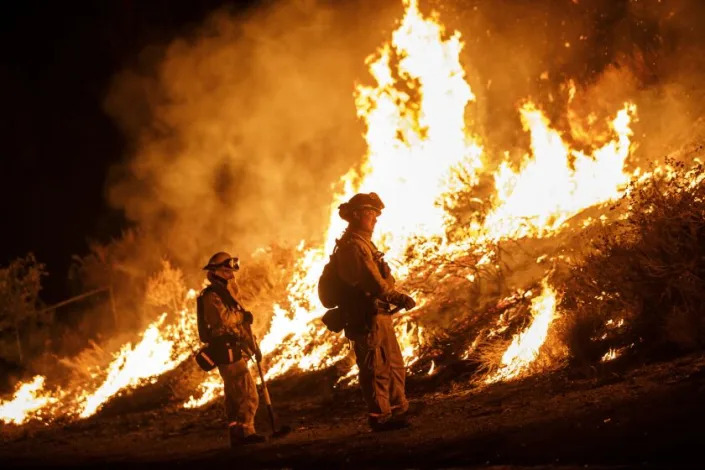
An Orange County man was acquitted Thursday of charges of igniting the massive Holy fire, which ripped through Cleveland National Forest in 2018, scorching over 23,000 acres and destroying 24 structures.
A jury acquitted Forrest Gordon Clark, 56, of three felony counts of arson in connection with the fire, which raged through Orange and Riverside counties. Clark was arrested in August 2018, maintaining he “was asleep” when the fire started on Aug. 6.
Public defender Jason Phlaum said fire experts had made a “rush to judgment” in accusing Clark, who had been described as a “weird guy with long hair” by neighbors.
Calls to Phlaum’s office on Thursday were not immediately returned.
Clark had been charged with aggravated arson of five or more inhabited structures, arson of an inhabited structure or dwelling, and arson of structure or forest. The jury trial began in March.
Two counts of resisting arrest were dropped in 2018.
The jury, however, did convict Clark on Thursday of one felony count of making criminal threats.
Kimberly Edds, spokesperson for the Orange County district attorney’s office, said that Clark was sentenced to two years in prison but released for time already served.
Prosecutors said shortly after his arrest that Clark presented “an unreasonable risk of danger to society and presents a clear threat to public safety.”
Neighbor Mike Milligan accused Clark in 2018 of berating him because of differing religious views and said he believed Clark had cut his water line at one point.
“Forrest is an extremely intelligent person, and honest to God, he does have psychological issues, but he knows what he’s doing,” Milligan said at the time. “When somebody comes after him, he [doesn’t] respond normally by walking away or negating it or forgetting about it. He lashes out.”
Clark’s brother, Everett, filed a restraining order on behalf of himself and his mother against Clark in 2012, alleging that he had spat in his face and pushed him. He added that his brother had smashed potted plants and threatened to shoot his dog.
“He does small hateful things to me all the time,” Everett Clark wrote at the time.
Carrie Braun, a spokeswoman for the Orange County Sheriff’s Department, said in 2018 that deputies have dealt with Forrest Clark since 2006. He had a long history of feuding with neighbors, who suspected him of being involved in a series of local thefts and incidents of vandalism.
But Clark was never linked to those crimes.
Nevertheless, it was these types of feuds and allegations against him by neighbors and family members that buttressed investigators’ belief that Clark may have been behind the fire, officials said. source

